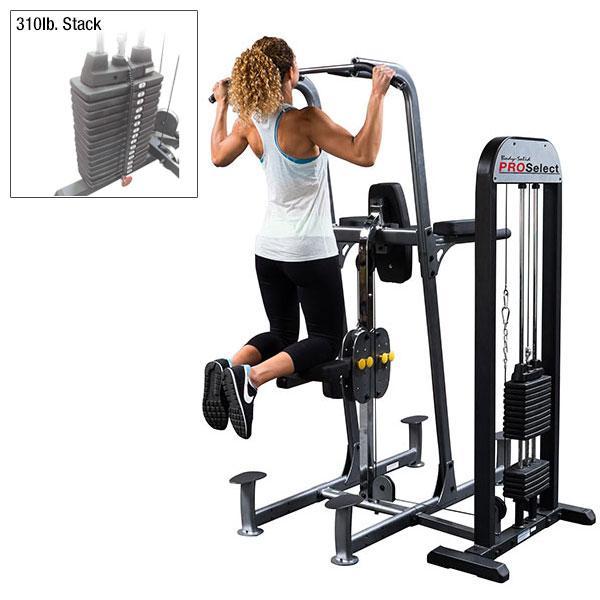How do you train to do pull-ups if you can’t do a pull-up?
The weight-assisted pull-up machine could be your ticket to a V-taper and hitting sets of 20 pull-ups, this time next year!
Let’s look at how you use them and which ones to look out for when building your dream home gym.
What You Need To Know About Weight-Assisted Pull Ups
The weight-assisted pull-up machine is a pulley-loaded platform that helps you perform pull-ups by reducing your effective weight. It helps you strengthen your arms, upper back, and grip at the same time.
By lifting a customizable amount of your body weight, it lets you work as hard as you can, but ensures you can perform the full repetition.
You can use a home gym option like the Body-Solid weight assist machine, for example,
or a commercial alternative like the single-purpose Pro Clubline chin and dip machine.
This is an easy way for you to build your first unassisted pull-up; you can build the muscles (like the lats, lower traps, and biceps) to prepare for your first pull-up. It’s an easy way to build muscle and improve your physique while building towards that huge gymnastic strength milestone.
The main things you need to look for are:
Weight selectors and increments
A comfortable pad that suits your space
Additional handles – like dip handles – for more training options
A good height for your home gym (like a basement or garage!)
A suitable top-end weight for your strength and body weight
If these are correct, then it’s time to learn how to use a weight-assisted pull-up machine to get you to pull-up goal.
How To Use An Assisted Pull-Up Machine
To use an assisted pull-up machine, you need to choose the right handles for your goals, then select a weight that makes your chosen reps challenging but possible.
Most assisted chin-up machines have multiple handles so you can target different muscles. These include wide-grip handles, ‘neutral’ handles, and close handles for chin-ups (where your hands are facing your body).
Choose your handles and the amount of weight support you want before starting. Once you put weight on the platform, you’ll need to get off to change the weight.
Performing An Assisted Pull Up
Here’s an easy 6-step outline for performing a weight-assisted pull-up:
Take a firm grip on the handles and place your feet or knees on the platform
Lower yourself under control, feeling the lats and biceps lengthen as your arms reach full length
Reverse the motion by pulling your shoulders away from your ears, bending your elbows, and squeezing your shoulder blades down and together
Keep pulling until you’re as high as possible – with your head above the handles
Hold the top position briefly, squeezing your shoulders down and elbow closed
Slowly lower back down to the starting position to complete the rep
Knees In Front Of Hips
“When performing your assisted pull-up or chin-up, keep your knees in front of your body at all times. This reduces the bend in your spine and keeps your core active during the exercise.”
This not only keeps your back safe from hyperextension-stress, but also improves your focus on the lats. If you bend backwards too much (and end up looking at the handles), you’ll shift the load into the wrong muscles, limiting your lat growth.
Focus On The Hold!
Focus on holding the top position and feeling the tension in your lats and biceps. This helps load these muscles, and improves your control of the movement.
It’s also a great way to improve joint health, reducing the risk of dumping your ‘lowering’ forces into the joint. Your muscles exist to do this job – focus on using them properly the whole way!
Lower Yourself Slowly For Faster Growth
When you’re trying to get stronger, the lowering portion should be controlled. It’s a great way to build up additional strength from the same number of reps – especially on an assisted machine.
The top half of the movement may not be assisted, depending on your height. This is also the easier part so it’s great to focus on using your own strength for it.
Lowering under control will make your pull-ups more effective in driving muscle growth and strength, so take them seriously!
The post How to use a weight-assisted pull up machine appeared first on FitNotch.
